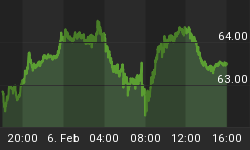It is a basic rule of human nature not to voluntarily self inflict pain upon ourselves. If there is any way to avoid the day of reckoning, even if it means the eventual catastrophe will be much worse if we delay, we always choose to hold reality in abeyance. This principle applies to countries as well because the notion of embracing austerity on a national level goes against the grain of our collective psyche.
But the United States faces a date with austerity regardless of whether it is voluntary or forced upon us. Our Q3 GDP report clearly illustrated that although growth is anemic (just 2%), inflation is creeping much higher. Despite the fact that we are in a revenue, earnings and capital goods recession; the rate of inflation doubled from 1.5% during Q2, to 3% in the current quarter. However, now the U.S. faces the Fiscal Cliff come January and that would throw the already fragile economy into a deep recession. The question is will our government voluntarily push the economy over the edge.
The truth is that the developed world faces a decision that is unbearably sharp and impossible to avoid. Either to drastically cut spending now in the hope of getting their debt to GDP ratios under control; or continue to borrow and spend until the market causes a full-blown currency and bond market crisis. The problem is that accepting austerity at this juncture would push already recessionary economies much deeper into the abyss. That's because it will take some time before the private sector can absorb those individuals that formerly were employed by the government or relied on transfer payments for their consumption. And tax hikes steal money from the job creators and hand it over to government to be misallocated.
As the U.S. approaches the Fiscal Cliff, markets have already begun to price in its effects. The drop in government spending and increased tax revenue of around $600 billion in 2013 would cause most asset prices to fall. The reduction in government spending would also lead to a fall in money supply growth.
But austerity is something that individuals and governments have a long history of avoiding at all costs. It is my belief that the U.S. will back away from the cliff and decide to adopt a stopgap measure that extends the current tax rates and eliminates most spending cuts. The plan would then be to reach a grand bargain down the road where republicans and democrats agree on a combination of increased revenue and entitlement reform that cuts $4-6 trillion of additional debt over the next decade. However, if our government cannot agree on massive fiscal reform while there is the Fiscal Cliff hanging over its head, why will they agree down the road when no such sequestration exists?
Washington appears to be offering us two choices; trillion dollar deficits every year until we have a currency and bond market crisis or to go over the Fiscal Cliff in January. If D.C. cannot agree now to accept austerity, even after we have run up $16.2 trillion in debt, why should anyone believe they will reach an agreement in the future? Another problem is that even if we do actually cut around $5 trillion in projected deficits over the next decade, we will still be adding another $5 trillion in debt over the next ten years. That's because these proposed cuts aren't really cuts in existing debt but merely a reduction in the growth rate of new debt.
The truth is that austerity is unavoidable in the debt-laden developed world. Austerity is by its very nature both depressionary and deflationary. That is why it is never chosen voluntarily. It is simply much easier to continue to borrow and spend until your creditors finally cut you off. I fear that is the path of least resistance and we will see rapid growth in the money supply, a fall in the dollar and risk asset prices soar once the U.S. decides to reject the opportunity to voluntarily confront its debt addictions at this time.















